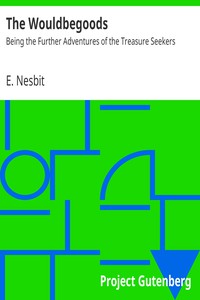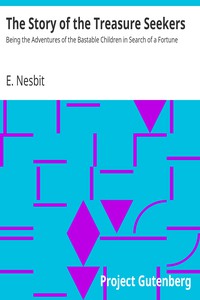The Wouldbegoods: Being the Further Adventures of the Treasure Seekers, E. Nesbit [red novels .TXT] 📗

- Author: E. Nesbit
Book online «The Wouldbegoods: Being the Further Adventures of the Treasure Seekers, E. Nesbit [red novels .TXT] 📗». Author E. Nesbit
Oswald said he hoped so, but he was not pleased. Because this sort of jaw was exactly the sort of thing he and Dicky didn’t want to have happen.
The thing we got it hottest for was those little tubs off the garden railings. They turned out to be butter-tubs that had been put out there ‘to sweeten’.
But as Denny said, ‘After the mud in that moat not all the perfumes of somewhere or other could make them fit to use for butter again.’
I own this was rather a bad business. Yet we did not do it to please ourselves, but because it was our duty. But that made no difference to our punishment when Father came down. I have known this mistake occur before.
CHAPTER 3. BILL’S TOMBSTONE
There were soldiers riding down the road, on horses two and two. That is the horses were two and two, and the men not. Because each man was riding one horse and leading another. To exercise them. They came from Chatham Barracks. We all drew up in a line outside the churchyard wall, and saluted as they went by, though we had not read Toady Lion then. We have since. It is the only decent book I have ever read written by Toady Lion’s author. The others are mere piffle. But many people like them. In Sir Toady Lion the officer salutes the child.
There was only a lieutenant with those soldiers, and he did not salute me. He kissed his hand to the girls; and a lot of the soldiers behind kissed theirs too. We waved ours back.
Next day we made a Union Jack out of pocket-handkerchiefs and part of a red flannel petticoat of the White Mouse’s, which she did not want just then, and some blue ribbon we got at the village shop.
Then we watched for the soldiers, and after three days they went by again, by twos and twos as before. It was A1.
We waved our flag, and we shouted. We gave them three cheers. Oswald can shout loudest. So as soon as the first man was level with us (not the advance guard, but the first of the battery)—he shouted—
‘Three cheers for the Queen and the British Army!’ And then we waved the flag, and bellowed. Oswald stood on the wall to bellow better, and Denny waved the flag because he was a visitor, and so politeness made us let him enjoy the fat of whatever there was going.
The soldiers did not cheer that day; they only grinned and kissed their hands.
The next day we all got up as much like soldiers as we could. H. O. and Noel had tin swords, and we asked Albert’s uncle to let us wear some of the real arms that are on the wall in the dining-room.
And he said, ‘Yes’, if we would clean them up afterwards. But we jolly well cleaned them up first with Brooke’s soap and brick dust and vinegar, and the knife polish (invented by the great and immortal Duke of Wellington in his spare time when he was not conquering Napoleon. Three cheers for our Iron Duke!), and with emery paper and wash leather and whitening. Oswald wore a cavalry sabre in its sheath. Alice and the Mouse had pistols in their belts, large old flint-locks, with bits of red flannel behind the flints. Denny had a naval cutlass, a very beautiful blade, and old enough to have been at Trafalgar. I hope it was. The others had French sword-bayonets that were used in the Franco-German war. They are very bright when you get them bright, but the sheaths are hard to polish. Each sword-bayonet has the name on the blade of the warrior who once wielded it. I wonder where they are now. Perhaps some of them died in the war. Poor chaps! But it is a very long time ago.
I should like to be a soldier. It is better than going to the best schools, and to Oxford afterwards, even if it is Balliol you go to. Oswald wanted to go to South Africa for a bugler, but father would not let him. And it is true that Oswald does not yet know how to bugle, though he can play the infantry ‘advance’, and the ‘charge’ and the ‘halt’ on a penny whistle. Alice taught them to him with the piano, out of the red book Father’s cousin had when he was in the Fighting Fifth. Oswald cannot play the ‘retire’, and he would scorn to do so. But I suppose a bugler has to play what he is told, no matter how galling to the young boy’s proud spirit.
The next day, being thoroughly armed, we put on everything red, white and blue that we could think of—night-shirts are good for white, and you don’t know what you can do with red socks and blue jerseys till you try—and we waited by the churchyard wall for the soldiers. When the advance guard (or whatever you call it of artillery—it’s that for infantry, I know) came by, we got ready, and when the first man of the first battery was level with us Oswald played on his penny whistle the ‘advance’ and the ‘charge’—and then shouted—
‘Three cheers for the Queen and the British Army!’ This time they had the guns with them. And every man of the battery cheered too. It was glorious. It made you tremble all over. The girls said it made them want to cry—but no boy would own to this, even if it were true. It is babyish to cry. But it was glorious, and Oswald felt differently to what he ever did before.
Then suddenly the officer in front said, ‘Battery! Halt!’ and all the soldiers pulled their horses up, and the great guns stopped too. Then the officer said, ‘Sit at ease,’ and something else, and the sergeant repeated it, and some of the men got off their horses and lit their pipes, and some sat down on the grass edge of the road, holding their horses’ bridles.
We could see all the arms and accoutrements as plain as plain.
Then the officer came up to us. We were all standing on the wall that day, except Dora, who had to sit, because her foot was bad, but we let her have the three-edged rapier to wear, and the blunderbuss to hold as well—it has a brass mouth and is like in Mr Caldecott’s pictures.
He was a beautiful man the officer. Like a Viking. Very tall and fair, with moustaches very long, and bright blue eyes. He said—
‘Good morning.’
So did we.
Then he said—
‘You seem to be a military lot.’
We said we wished we were.
‘And patriotic,’ said he.
Alice said she should jolly well think so.
Then he said he had noticed us there for several days, and he had halted the battery because he





Comments (0)